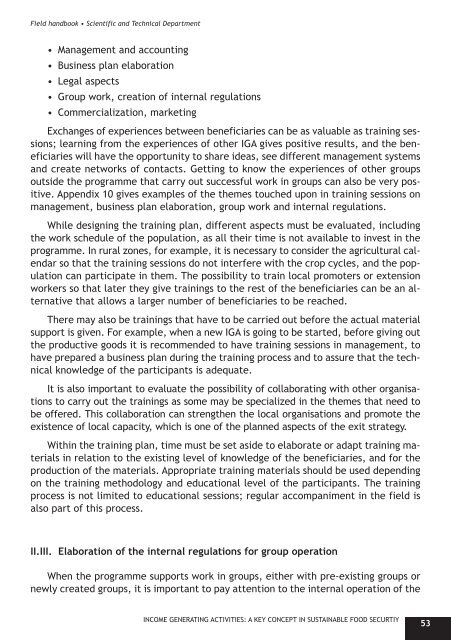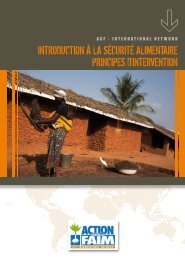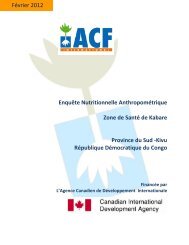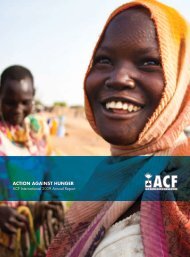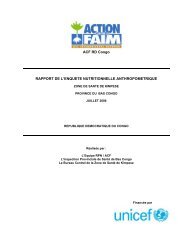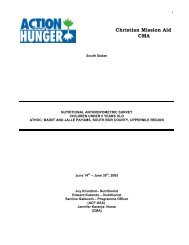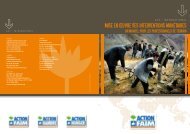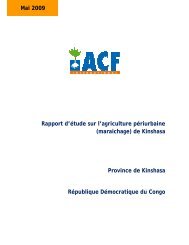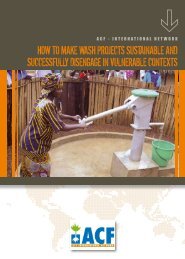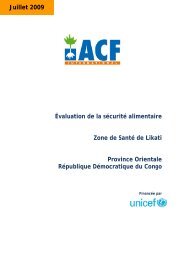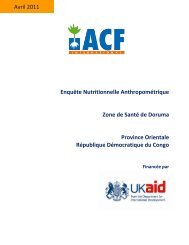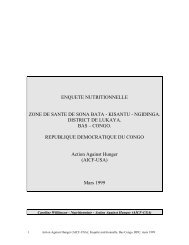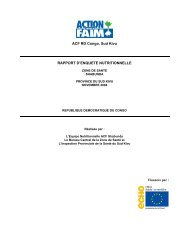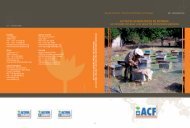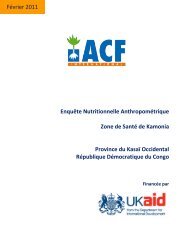Income-Generating Activities - Action Against Hunger
Income-Generating Activities - Action Against Hunger
Income-Generating Activities - Action Against Hunger
Create successful ePaper yourself
Turn your PDF publications into a flip-book with our unique Google optimized e-Paper software.
Field handbook • Scientific and Technical Department<br />
• Management and accounting<br />
• Business plan elaboration<br />
• Legal aspects<br />
• Group work, creation of internal regulations<br />
• Commercialization, marketing<br />
Exchanges of experiences between beneficiaries can be as valuable as training sessions;<br />
learning from the experiences of other IGA gives positive results, and the beneficiaries<br />
will have the opportunity to share ideas, see different management systems<br />
and create networks of contacts. Getting to know the experiences of other groups<br />
outside the programme that carry out successful work in groups can also be very positive.<br />
Appendix 10 gives examples of the themes touched upon in training sessions on<br />
management, business plan elaboration, group work and internal regulations.<br />
While designing the training plan, different aspects must be evaluated, including<br />
the work schedule of the population, as all their time is not available to invest in the<br />
programme. In rural zones, for example, it is necessary to consider the agricultural calendar<br />
so that the training sessions do not interfere with the crop cycles, and the population<br />
can participate in them. The possibility to train local promoters or extension<br />
workers so that later they give trainings to the rest of the beneficiaries can be an alternative<br />
that allows a larger number of beneficiaries to be reached.<br />
There may also be trainings that have to be carried out before the actual material<br />
support is given. For example, when a new IGA is going to be started, before giving out<br />
the productive goods it is recommended to have training sessions in management, to<br />
have prepared a business plan during the training process and to assure that the technical<br />
knowledge of the participants is adequate.<br />
It is also important to evaluate the possibility of collaborating with other organisations<br />
to carry out the trainings as some may be specialized in the themes that need to<br />
be offered. This collaboration can strengthen the local organisations and promote the<br />
existence of local capacity, which is one of the planned aspects of the exit strategy.<br />
Within the training plan, time must be set aside to elaborate or adapt training materials<br />
in relation to the existing level of knowledge of the beneficiaries, and for the<br />
production of the materials. Appropriate training materials should be used depending<br />
on the training methodology and educational level of the participants. The training<br />
process is not limited to educational sessions; regular accompaniment in the field is<br />
also part of this process.<br />
II.III. Elaboration of the internal regulations for group operation<br />
When the programme supports work in groups, either with pre-existing groups or<br />
newly created groups, it is important to pay attention to the internal operation of the<br />
INCOME GENERATING ACTIVITIES: A KEY CONCEPT IN SUSTAINABLE FOOD SECURTIY<br />
53


